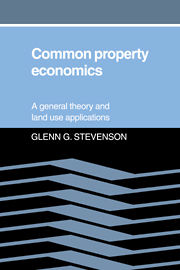Book contents
- Frontmatter
- Contents
- List of Tables and Figures
- Preface
- 1 What Is Common Property?
- 2 Open Access Theory
- 3 Common Property
- 4 The Swiss Grazing Commons
- 5 Comparisons with the English Open Field System
- 6 An Econometric Comparison of Commons and Private Grazing
- 7 The Structure and Performance of Common Property: Conclusions
- References
- Index
5 - Comparisons with the English Open Field System
Published online by Cambridge University Press: 16 September 2009
- Frontmatter
- Contents
- List of Tables and Figures
- Preface
- 1 What Is Common Property?
- 2 Open Access Theory
- 3 Common Property
- 4 The Swiss Grazing Commons
- 5 Comparisons with the English Open Field System
- 6 An Econometric Comparison of Commons and Private Grazing
- 7 The Structure and Performance of Common Property: Conclusions
- References
- Index
Summary
The open field system that prevailed in England and much of the rest of Europe during the late Middle Ages provides a number of parallels to common grazing in Switzerland. Indeed, common alpine grazing probably emerged from a similar social system placed in a mountainous environment. In this chapter, I draw parallels in rights, origins of rights, regulations, fees and fines, and the meetings held to decide land use rules, as well as point out some contrasts. This will put the Swiss system in a wider context, both for those familiar with the English system and for those who are not.
The comparisons I make are to a large extent between a historical system in England and a current system in Switzerland. The common property of England has mostly died out, whereas most of the discussion of Switzerland concerns practices that continue to this day. Therefore, where contrasts exist, it is not always possible to tell whether they indicate that the Swiss system is more mature or that the difference between environments is responsible. This is the case in part because thorough historical research was not one of my main objectives in Switzerland.
One sharp contrast between the two systems should be kept in mind. The British open field system centered around growing crops, whereas the Swiss system is dominantly pastoral. Grazing did occur as a significant component of the English system, but it was secondary.
- Type
- Chapter
- Information
- Common Property EconomicsA General Theory and Land Use Applications, pp. 143 - 157Publisher: Cambridge University PressPrint publication year: 1991



